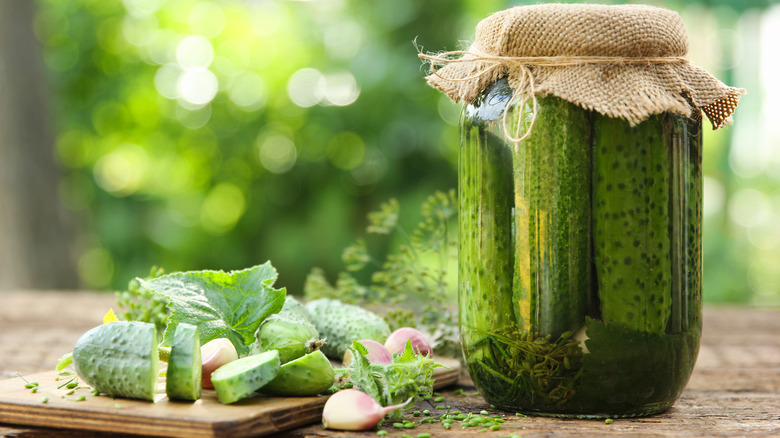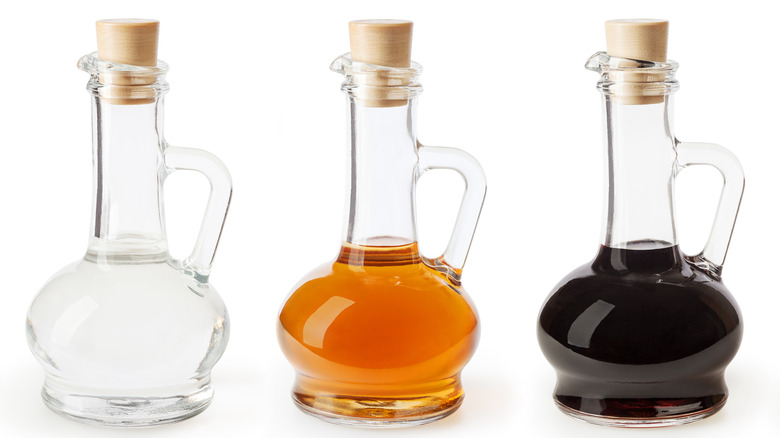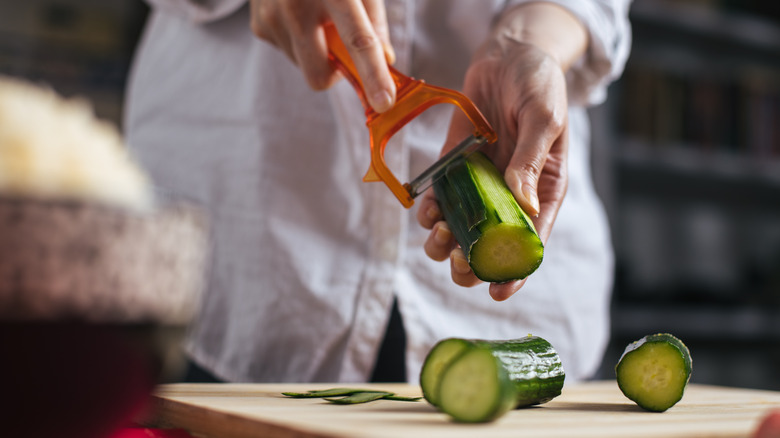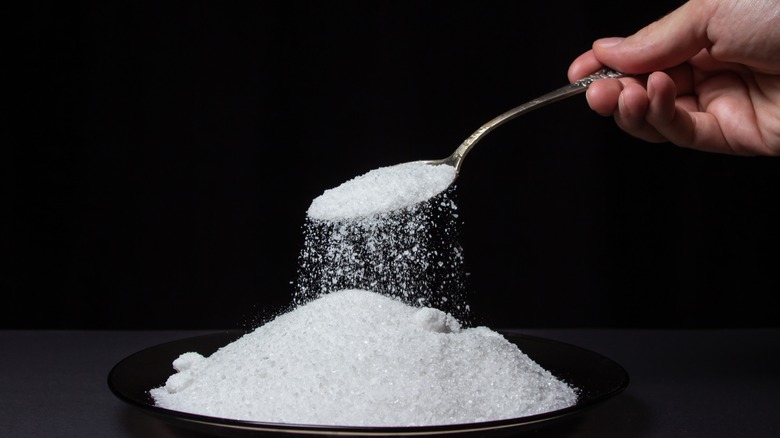The Potential Reasons Your Homemade Canned Pickles Are Bitter
People have been pickling things since 2023 B.C. in India, per PBS. The word stems from the Dutch word pekel and northern German word pókel, which literally means to salt or brine — an essential to the pickling process that also includes water, sugar, and vinegar. Christopher Columbus brought pickles to the Americas in the 15th century because they were nutrient-rich, lasted a long time, and prevented scurvy, according to the History Channel. By the time World War II was in full swing, the U.S. government rationed the staple and 40% of them were sent to soldiers in combat — much for the same reasons Columbus found them to be a necessity. These days, Americans consume more than 20 billion pickles per year.
But, when it comes to making these snack favorites at home, opinions vary on method with margin for error. If you're like Andy Griffith and Barney Fife who couldn't figure out why Aunt Bee's pickles tasted like kerosene, there may be no easy fix other than tossing the entire batch and starting from scratch. Whether you're making quick pickles, or perhaps in it for the long haul with wild fermentation for which the godfather of fermentation himself, Sandor Katz, suggests: "The biggest variables in pickle-making are brine strength, temperature, and cucumber size." That being said, there are several reasons why your canned pickles are coming out of the bath on the bitter side.
Be mindful of your vinegar and spices
Many pickle recipes like this one from The Spruce Eats call for the addition of spices such as black pepper, mustard seeds, and allspice berries to your brine that can lean toward the bitter side naturally. So, if you've cooked your spices too long in the vinegar, or even were heavy-handed with the spices, these mishaps are primary culprits along with the fact that your vinegar's strength may also be off, per The National Center for Home Preservation (HFP). The organization recommends a 5% acidity solution for proper balance.
Never fear, though. Vinegar is your friend. It helps slow down and often prevents spoilage altogether. "When living organisms die, they activate several responses in the tissue that trigger the release of enzymes," Cornell University's processing expert, Dr. Bruno Xavier told Food & Wine. These enzymes are an early step in the decaying process, but the acid in vinegar saves the day and slows it down.
But, all vinegars aren't created equal. For example, balsamic vinegar is great for finishing recipes, but it's not the best as a cooking ingredient because heat can destroy its intended nose. Instead, reach for distilled white vinegar or apple cider vinegar for a cleaner palate primed for pickle making. Simply bring your recipe's brine solution to a boil and simmer for three minutes to meld the flavors.
Bitterness can be hiding in the peel
While you can control the type of vinegar and spices you use, there is one element of pickle making you can't control: the weather. When cucumbers are stressed by dry weather and drought, a compound called cucurbitacin will inevitably show its bitter cards in the vegetable's skin. While no one likes a bitter pickle, the compound plays an important role for the vegetable as it grows. "Bitterness is a good defense against animals that might eat them—including humans," explains Jonathan Deutsch, a professor of culinary arts and food science at Drexel University to Epicurious. He recommends cutting the cucumber ends off prior to peeling, otherwise every time your peeler hits the cucumber's flesh it will continue to spread the bitterness.
However, in a perfect world, it's ideal to leave the cucumber skin on as it boasts high levels of antioxidants, promotes hydration, and according to Healthline, may even promote regularity. But, they are useless if the pickle is inedible. By tasting the cucumbers prior to processing, you'll eliminate the batch's risk of undue acridity. But, if your cucumbers did fall victim to the weather, no need to throw them out quite yet. Simply peel and cut them in ¼-inch thick discs as in John Willoughby's Easy Cucumber Pickles adapted by The Splendid Table.
Nothing beats the real thing when it comes to salt
Omitting salt in your brine is not an option for fermented pickles because the safety and texture of a batch depends on it. And, while salt isn't completely necessary in a non-fermented recipe, salt combined with acid aids in preserving the pickles for a shelf life of up to 2 years for unopened jars (per Can It Go Bad?). Plus, they just taste better.
Still, Americans consume more than 3,400 milligrams of sodium daily — well beyond the recommended 2,300 milligrams per day, according to the CDC. So, in the name of heart health, some opt for a salt substitute such as Mrs. Dash. These alternatives often contain potassium chloride, which is known to reduce the presence of sodium in the diet by nearly 70%, according to WebMD. But, potassium chloride doesn't block bitter notes like sodium does because it "doesn't activate the same taste cells," Paul Breslin, PhD, a member of the Monell Chemical Senses Center and professor of nutritional sciences at Rutgers University explains to Consumer Reports. He adds that our bodies need sodium to function, which is why we crave it so much.
But, if you're still worried about your salt intake, this quick dill pickle recipe bypasses the canning process and only requires one tablespoon of salt for the entire batch. These quickles don't need a lot of salt because they're so delicious that they won't last long.



